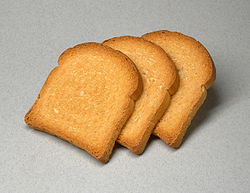 | |
| Type | Bread |
|---|---|
| Place of origin | Germany |
| Region or state | East Prussia |
| Main ingredients | Flour, eggs, sugar |
Zwieback is a form of rusk eaten in Poland, Germany, Scandinavia, Austria, France, Belgium, The Netherlands, Switzerland, Italy, Slovenia, Bosnia, Croatia, Serbia, North Macedonia, Bulgaria, Greece, and Turkey. It is a type of crisp, sweetened bread, made with eggs and baked twice. It originated in East Prussia. The Mennonites brought Zwieback to the Russian Empire; before the Russian Revolution, when many emigrated to the west, they brought Zwieback to Canada, the United States and other parts of the world.
There are two types of zwieback. One type is made by pinching round pieces of dough, placing one piece on top of another, pressing them together by pushing a finger down through both pieces. It is then baked and served as warm soft rolls. This type is identified with Mennonites. The other type is a bread sliced before it is baked a second time, which produces crisp, brittle slices that closely resemble melba toast.[1] Zwieback is commonly used to feed teething babies [1] and as the first solid food for patients with an upset stomach.
The name comes from German zwei ("two") or zwie ("twi-"), and backen, meaning "to bake".[2] Zwieback hence literally translates to "twice-baked". The French and Italian names, respectively, biscotte and fette biscottate have the same origin, biscotto (biscuit), which also means twice ("bis-") baked (-"cotto"). The Slovene name is prepečenec which would imply baked over ordinary or overbaked. The Croatian name is dvopek which, again, is literally twice (dvo) baked (pek).